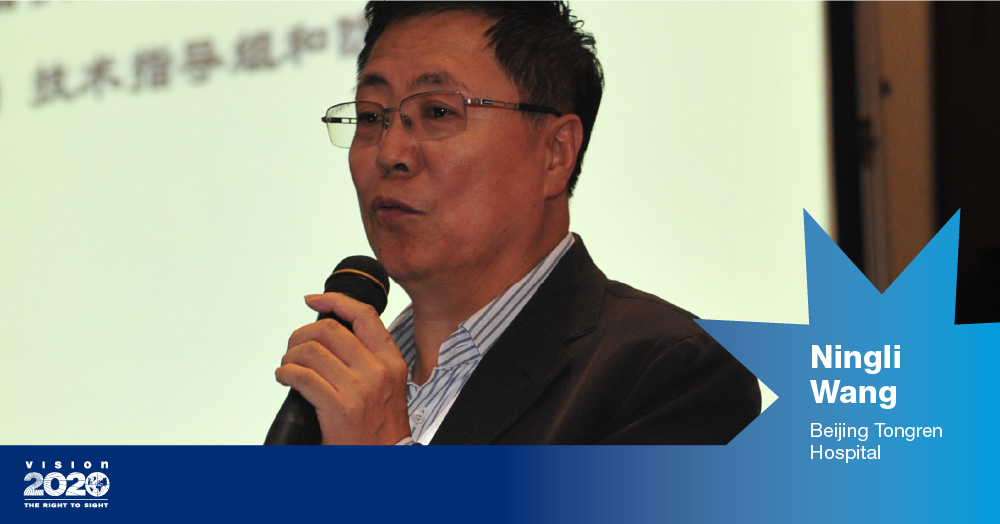Join a powerful, unprecedented alliance for better eye health for all.
Join IAPB-
Choose an alternate language here

Under VISION 2020 initiative, Prof. Wang dedicated great efforts in blinding trachoma elimination and reducing blindness rate of cataract. In 2012, as one of co-leaders of “SightFirst China Action” Project, he led the project on the screening, treatment and evaluation of trachoma in China, personally visited remote areas with the most severe water shortage and worst hygiene condition to collect sample and verify the specificity and sensitivity of the diagnosis, and was awarded Achievement Award of Eliminating Blinding Trachoma for his contribution. As deputy head (2009) and head (2017) of Expert Advisory Committee, he participated in 2 national cataract projects benefiting nearly 2 million patients. He also led the preparation of cataract operation specifications and quality control standards, and actively promoted the incorporation of cataract surgery into national basic medical insurance.
He also made great contribution in incorporating myopia control into national strategy, especially, with Anyang Childhood Eye Study he led providing solid data and epidemiological evidence for policy-making. Furthermore, he is the head of NCPB Myopia Control Expert Group, and assisted government in preparing technical guidance, FAQs and manuals for myopia control in difference age groups. Moreover, he developed wearable devices, which act as critical interventions in myopia prevention. He led the China Visual Impairment Resource Centre to carry out low vision rehabilitation work nationwide, including holding training courses and forums, training over 300 people nationwide, with over 1,000 ophthalmologists and scholars participating and benefiting from forums.
He actively promoted the establishment of 2 three-tier blindness prevention networks: national-provincial-municipal management system and county-township-village eye care network, thereby integrating primary eye care into primary health care. He serves as PI of the AI-Assisted tele-ophthalmic center, a cooperative platform with more than 200 hospitals nationwide for remote consultation and collaborative treatment, greatly reducing time and economic cost of patients.
Apart from regular training courses, he founded Beijing Tongren Charity Foundation, supporting training of eye care personnel at primary level, for example, the STEER project launched in cooperation with NGO aims at improving eye care capacity of county-level hospitals. Currently, over 70 hospitals were enrolled, with about 350 eye care personnel, 3000 village doctors and about 2000 schoolteachers trained, and more than 830000 people screened.
With relentless effort, surveys in 2006 and 2014 showed in the population over 50 years old, prevalence of blindness decreased by 27%, and prevalence of MSVI decreased by 16%.
To properly summarize the efforts and achievements made under the VISION 2020 initiative and to comprehensively introduce the current eye health situation in China, he led the preparation of the White Paper on Eye Health in China and launched it on China National Eye Care Day in 2020. Apart from efforts in China, he has also actively engaged in various international research projects, such as Multi-center Genetic Study of Primary Angle Closure Glaucoma, The Asian Eye Epidemiology Consortium, Aqueous Angiography Safety Research, Vision Loss Expert Group of Global Burden of Disease, Lancet Global Health Commission on Global Eye Health to share the perspectives and experience from China.